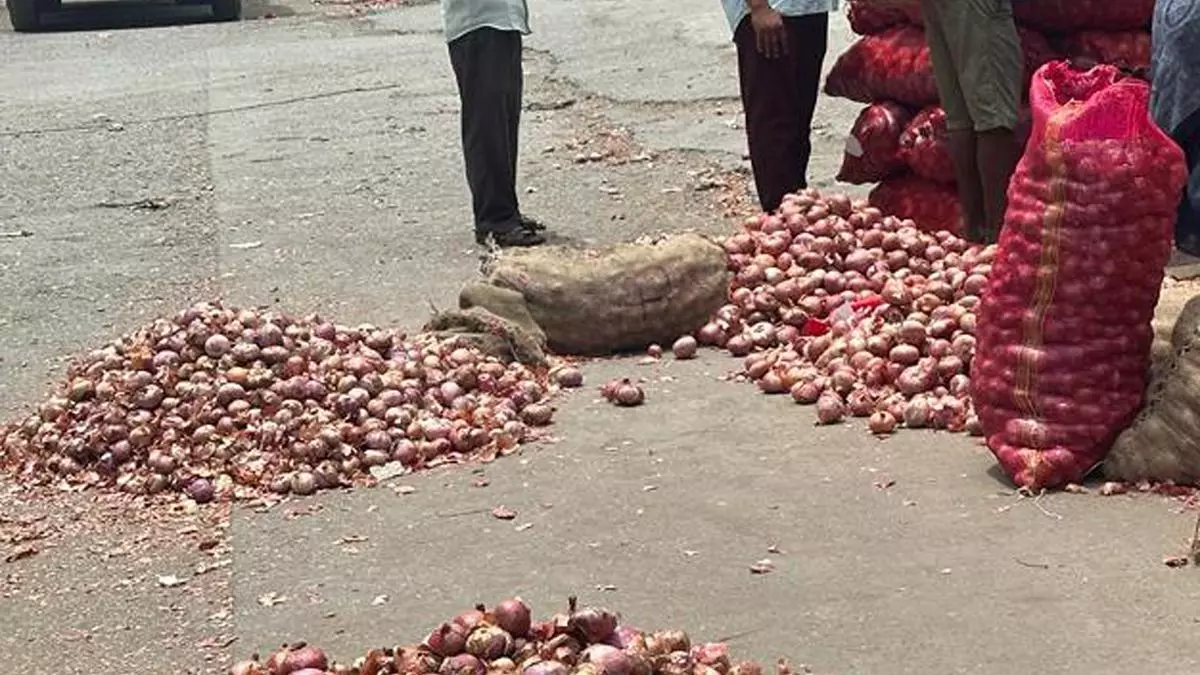Nafed starts selling onion through e-NAM, to scale up operation
Co-operative major Nafed has sold over 325 quintals of onions through the government’s online marketplace e-NAM on a single day as a pilot project as part of the Centre efforts to increase the kitchen staple’s availability to check any price rise.
After the success in Himachal Pradesh, which has been devastated by landslides and heavy rains, Nafed has now asked its branch officers to contact local mandis and publicise such sales through the electronic platform so that maximum buyers participate in the online auction.
On the instructions from the Department of Consumer Affairs, which manages pulses and onion under the Price Stabilisation Fund (PSF) scheme, Nafed last week started dispatching the onion from the buffer stock to Telangana, Andhra Pradesh, Himachal Pradesh, Delhi, Assam, Tamil Nadu, Kerala, Punjab, Karnataka and Odisha as most of its stocks are in Maharashtra.
First sale
Nafed this year procured 1.51 lakh tonnes (lt) of rabi onion from Maharashtra and Madhya Pradesh while the other co-operative NCCF (National Cooperative Consumers Federation) purchased about 1.5 lt to build the buffer of 3 lt. But last week, the government raised the buffer limit to 5 lt by asking these two agencies to buy 1 lt each.
“The first sale was made at Parwanoo (Himachal Pradesh) on August 19 and traders who participated in the auction are satisfied with the quality of the produce,” said a senior official of the Consumer Affairs and Food Ministry. Since e-NAM has a drawback of not being able to guarantee the quality of the produce, many buyers outside the mandi do not show interest and Nafed has decided to display the stock for traders to inspect it physically so that they can participate in the auction.
“We are expecting more number of e-NAM mandis to sell Nafed’s onion, particularly in Punjab, Haryana, Andhra Pradesh, West Bengal, Uttar Pradesh and Telangana,” the official said. Nafed was earlier the sole procuring agency of onions on behalf of the government and NCCF was notified as the second agency this year particularly taking care of retail sales in Delhi.
Procurement and sales of onion under PSF (price stabilisation fund) are done under the instruction of the Government. The timing and price of sales to States and retail consumers are also decided by the Department of Consumer Affairs. Besides, maximum stocks are sold through auction in APMC-run mandis to increase availability in market and keep prices stable.
New initiatives
The official said selling onion through the e-NAM platform will bring more transparency and reduce transactional costs, benefiting both sellers and buyers.
Regarding some new initiatives on onion procurement, sources said Nafed has raised minimum recovery of “A” grade onion at 56 per cent of the purchased stock and allowed storage loss of up to 18 per cent through a transparent process. Earlier, recovery limit was 51 per cent of the stored stock.
Nafed has also introduced geo-tagging of the stored locations as well as QR codes on storage bins, the sources said, adding that purchase, storage, payment and dispatches of stocks are getting recorded through a specific portal, monitored and verified by Nafed.
The all-India average retail price of onion was ₹32/kg and the wholesale rate was ₹2,483/quintal on August 24, according to data from the Consumer Affairs Ministry. The current retail price is 7 per cent higher than a week ago, 19 per cent up from the rate a month ago and 46 per cent up from the rate three months ago. Similarly, the current wholesale price is 7 per cent higher than a week ago, 21 per cent up from a month ago and 48 per cent up from three months ago, data show.
The Centre has recently imposed 40 per cent export duty to check outbound shipments and is reportedly considering to fix a base price to prevent under invoicing.
